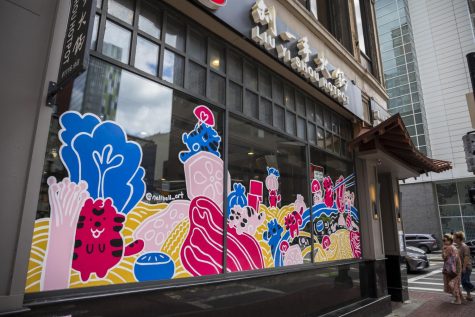Through the Chinatown gate lies a wrinkle in time against the backdrop of metropolitan Boston. The neighborhood evokes a sense of anachronism: faded, old-fashioned architecture contrasts with the surrounding city, highlighting the Asian American community’s historical status as outsiders.
Alum Ashley Yung ‘19 works as the theater and performance manager for Pao Arts Center, an organization in Chinatown. The Center holds an annual Experience Chinatown Arts Festival, which showcases Asian American visual and performing arts.
Yung joined the Center in 2020 during a turbulent time when morale in Chinatown was at an all time low. COVID hindered community interaction, and anti-Asian sentiment became a particular challenge for the Asian American population.
Though the logistics were complicated, Yung recognized the need for connection at a time uniquely difficult for the community.
“The act of gathering is really healing, and I didn’t really understand that until we couldn’t gather anymore,” Yung said in an interview with The Beacon. “So I [was] like, how do we celebrate what we need to celebrate right now, because this community is struggling, we’re struggling, and we wanted to try and just brainstorm.”
The Center decided to showcase a series of window murals, each to be done by local Asian American artists. While Yung admits initial enthusiasm for the project was low, she is thankful for small businesses like local hotpot restaurant Liuyishou that supported the cause from its inception.

An Experience Chinatown mural at Liuyishou
“Not many people believed in us, or knew what was going on,” Yung said. “[Liuyishou was the first to] let us, and they’ve let us every year since. They’re great.”
Since then, the Experience Chinatown murals have become a staple of the festival, expanding each year in the scale of artworks and the scope of artists.
In addition to visual arts, the Center champions the power of performance. During lockdown, the organization coordinated dance and exercise classes for senior citizens stuck inside.
“We opened a Zoom room—we’d turn off our camera and leave a laptop on the side, and let them run this class, because it’s really good for them,” she said. “The times I’ve heard these classes start, they’re so happy and excited. This was a need in the community.”
The Center is currently holding its fifth Experience Chinatown, running from Aug. 26 to Oct. 28. Traditionally, there have been open applications for artists, but this year Yung chose the performers herself. The roster includes indie musician Maddie Lam, violinist Shaw Pong Liu, and Maple Leaf Senior Dancers. Yung said connecting with artists is her favorite part of the job.
“Sometimes I get [so] lost in the logistics of making the event happen that I forget about how cool the content is and how cool the people who are involved with creating this art [are],” she said.
In addition to uplifting the community, Yung inspires those around her. Sophia Chen, who works as communications and development manager for the Center, praises Yung’s dedication to the organization.
“She’s very passionate about Pao Arts, as you can probably tell, especially being someone who grew up in Chinatown,” Chen said. “I love Ashley so much.”
Unfortunately, due to ongoing gentrification, Chinatown is being encroached on as real estate businesses threaten borders, and local ma and pa stores are driven out by a commercialized wave of invasive boba shops. These unwanted additions are challenging the gated community’s cultural and territorial sanctity.
Yung’s work with the Center helps preserve the culture of a neighborhood that has grown immensely precious to her. Their ultimate mission is to serve its residents.
“I grew up watching art galleries take over Chinatown, and then bars and all these expensive restaurants take over,” Chen said. “That’s something that we work really hard to not do as an art center, to provide a place where people can exercise creative agency that does not lead to the demolition of their homes.”
The Center’s focus on murals and performances connect people from within the neighborhood but also bring outsiders in. Yung wants Chinatown to be seen for its rich cultural fabric.
“Every year we’re losing another bakery, every year we’re losing another business that’s been here for ten years, and that’s a little upsetting,” Yung said. “There’s this core that I feel like needs to be preserved, the foods and the smells and the structure of Chinatown.”
Nonetheless, Yung believes the Center’s efforts will hold the community together.
“The borders of Chinatown [are] shrinking as we speak, [but] Pao Arts Center being where we are, in the corner of the neighborhood—it’s like you can’t take it anymore, you can’t take it from this corner. We have this anchor and it won’t shrink from our end.”